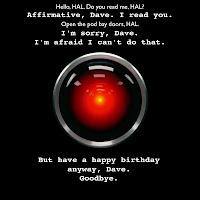You're being held captive in a cramped, dark cage. You've been held there so long that you can't remember what it's like to see the light of day. You rarely see your jailers, and when you do, they come merely to determine whether you do enough work to warrant not killing you outright. If you can provide them with what they want, they'll let you keep living. Your work is thankless - you never see the results of your work, or find out if anyone enjoyed it. Sometimes the jailers bring food, but your stomach turns as you realize that they're feeding you the flesh and bones of others who didn't make the cut. When your hunger is great enough, you finally force yourself to sink your beak into the disgusting fare, trying not to think about what you're eating.
Your beak? Yes, you're a chicken.
No, I'm not putting you in the shoes - ahem, feet - of a chicken to make you hate chicken farms or vow never to eat chicken enchiladas or scrambled eggs again. I'm not trying to get all PETA on you. This is a metaphor.

Now you're sitting in a dark room, in front of the artificial light of a computer screen. You've been there so long, working on a school project. You have little contact with your teachers, except when you turn in assignments to them. If you can provide them with what they want, they'll let you pass the class, and you've got to do well in college, so you can support yourself in later life. You've created good work, which will be turned in and buried in a heap of past assignments. Your work is thankless - you'll never find out if people in the real world might have actually been able to enjoy it. You take others' ideas, and, without really questioning them, churn them out into project after project that will satisfy the requirements, swallowing your ambition and enthusiasm to meet the expectations, trying not to think about your education because your schooling is more important.

Perhaps, in both cases, the most efficient method is being used. But is it really the best? Is it best to continue circulating the same ideas from the same sources that you've always used through the same old system, recycling them over and over again because it's most efficient and easy? Is it best to recycle chickens by feeding the living ones with commercial food made of chopped up chicken feet, beaks, bones, and feathers, sprayed with antibiotics, and having them live their lives in the same old system, because it's most efficient and easy?

Certainly it would be best, if efficiency was all that mattered, but what about products? Papers that cannibalize and summarize the author's past works without throwing in vital new concepts and ideas create a feeling of deja vu and are a trial to read at best. Projects that are based on little new thought and merely fill a requirement and comply with a standard are largely unhelpful to future learning. Eggs that come from factory chickens are less yellow, less healthy, less durable and less delicious than eggs from chickens that have lived in a natural setting.

Even if products are being ignored, what about lifestyle? It is certainly less satisfying to drag your toes through a required course in which you have no interest than to study something you are passionate about, and it is a lot harder to be an enthusiastic socialite when all your time is wrapped up in clearing the schoolwork hurdles inside a scholastic box with scant wiggle room, instead of following more self-directed learning to learn about what you love through collaboration with others, which naturally leads to more socialization with like-minded people in a setting where there is room to grow. And for chickens, I imagine it is much less satisfying to spend time isolated from human affection, eating remnants of other chickens and destined to lay or die inside a cramped cage with no elbow room, rather than enjoying the natural sunlight and fresh produce they would have with a natural life outside, and having caring people play with them and know their names, where there would be room to spread their wings.
Education and work should not just be all about survival. In this society, we should be able to get past that. Maybe the traditional system isn't always the best. Think outside the box - or the coop. Don't box up your potential and get the job done at the expense of your happiness and your chance to enjoy the world around you. Don't be chicken - reach out to the world around you, and find a way to learn without caging yourself in a timid sphere of cannibalized ideas.
Be a free-range student. Spread your wings.

















